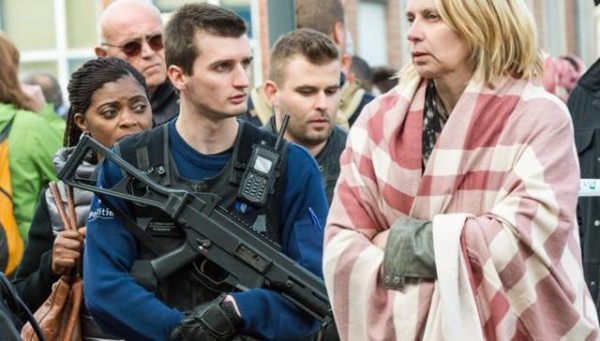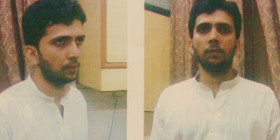Three explosions ripped through the international airport and a metro station in Brussels on Tuesday, killing at least 34 people in apparently coordinated strikes four days after a key suspect in last year’s Paris attacks was arrested in the city.
Two blasts targeted the main hall of Zaventem Airport at 8am (0700 GMT), and another went off at the Maalbeek metro station near the European Union’s main buildings while commuters were making their way to work in rush hour.
Authorities confirmed the involvement of a suicide bomber in the attack at the airport.
Twenty people died at the metro station and another 14 at the airport, Belgium’s public broadcaster RTBF reported. Belgian media reports put the number of injured at 130.
“We were fearing terrorist attacks, and that has now happened,” Belgian prime minister Charles Michel told reporters. Belgium raised its terror threat to Level 4, its highest level.
Earlier, interior minister Jan Jambon had warned of revenge attacks following the arrest of Salah Abdeslam, a prime suspect in the Paris attacks that killed 130 people, in the gritty neighbourhood of Molenbeek on Friday.
Jambon announced Belgium’s national security council was due to meet and deputy prime minister Alexander De Croo urged people to avoid making calls to stop the city’s mobile networks getting saturated, and to communicate with online messages instead.
A witness said he heard shouts in Arabic shortly before the two blasts in the packed airport departure lounge. Pictures on social media showed the ceiling had collapsed and smoke rising from the terminal building through shattered windows.
Videos shared on social media showed passengers fleeing down a slipway, some still hauling their bags.
A spokesperson for Brussels Metro confirmed casualties in an explosion on a train.
The explosions triggered a transport shutdown in Brussels, home to the headquarters of both the EU and Nato. Flights were halted and metro, tram and bus services were suspended.
“These attacks mark another low by the terrorists in the service of hatred and violence,” said EU President Donald Tusk.
Belgian authorities deployed 225 additional soldiers sent in Brussels and the Belgian Crisis Centre, clearly wary of a further incident, appealed to the population: “Stay where you are.”
Chaos at airport and metro station
There were chaotic scenes at the airport as passengers fled in panic. The blasts smashed the windows of the departure hall and sent ceiling tiles shattering to the floor.
“We heard the explosion and felt the blowback,” said Jean-Pierre Lebeau, a French passenger who had just arrived from Geneva, adding he had seen wounded people and “blood in the elevator”.
Brussels airport said it had cancelled all flights until at least 6am (0500 GMT) on Wednesday. The complex was evacuated and trains to the airport were stopped.
All three main long-distance rail stations in Brussels were closed and train services on the cross-channel tunnel from London to Brussels were suspended.
Airports in a string of cities across Europe swiftly announced they were boosting security, including in London, Paris, Frankfurt, Amsterdam, Copenhagen and Prague.
While most European airports are known for stringent screening procedures for passengers and their baggage, that typically takes place only after passengers have checked in and are heading to departure gates.
Although there may be discreet surveillance, there is nothing to prevent members of the public walking into the departure hall at Zaventem airport with heavy baggage.
Security services on alert
Security services had been in a high state of alert across western Europe for fear of militant attacks backed by the Islamic State, which had claimed the Paris attacks.
Following an attempted ramraid attack at Glasgow Airport in 2007, several airports stepped up security at entrances by altering the pick-up and drop-off zones to prevent private cars getting too close to terminal buildings.
Stocks hit by Brussels blasts
European stocks fell after the explosions, particularly travel sector stocks including airlines and hotels, pulling the broader indices down from multi-week highs. Safe-haven assets, gold and government bonds rose in price.
Sweden’s Prime Minister Stefan Lofven branded the blasts an “attack against democratic Europe”.
British premier David Cameron tweeted his country would do “everything we can to help,” and announced Britain’s COBRA security committee would meet on Tuesday to assess the situation.
Russian President Vladimir Putin said the blasts “show once more that terrorism knows no borders and threatens people all over the world”, according to a Kremlin statement. “The fight against this evil requires vital international cooperation,” he added.
The bloodshed came four days after the dramatic arrest in Brussels of Salah Abdeslam after four months on the run.
He is being held in a high-security prison in Belgium following his arrest in the gritty Brussels neighbourhood of Molenbeek, just around the corner from his family home.
Belgium’s foreign minister Didier Reynders said at the weekend that Abdeslam – believed to have played a key logistical role in the carnage in Paris – was planning some sort of new attack.
Survivors in shock
At the airport, Jean-Pierre Herman and his wife Tankrat Paui Tran embraced with shock on their faces. “My wife just arrived,” Herman said. “I said hello, we took the elevator and in the elevator we heard the first bomb.
“When we came out of the elevator at that moment the second bomb exploded and then we saw doors flying, (the) glass ceiling come down and smoke.”
Charlotte McDonald-Gibson, a British journalist living in Brussels, said there was “total confusion” at the airport, where she was having breakfast. “Suddenly staff rushed in and said we have to leave,” she said.
“They rushed out and into the main terminal A departures building. Nobody knew what was going on. It was total confusion, people were just standing around wondering what was happening.”
British Sky News television’s Alex Rossi, at the airport, said he heard two “very, very loud explosions”.
He added, “I could feel the building move. There was also dust and smoke as well…I went towards where the explosion came from and there were people coming out looking very dazed and shocked.”
Alphonse Youla, 40, who works at the airport, said he heard a man shouting out in Arabic before the first explosion. “Then the glass ceiling of the airport collapsed.”
“I helped carry out five people dead, their legs mangled,” he said, his hands covered in blood.




Leave a reply